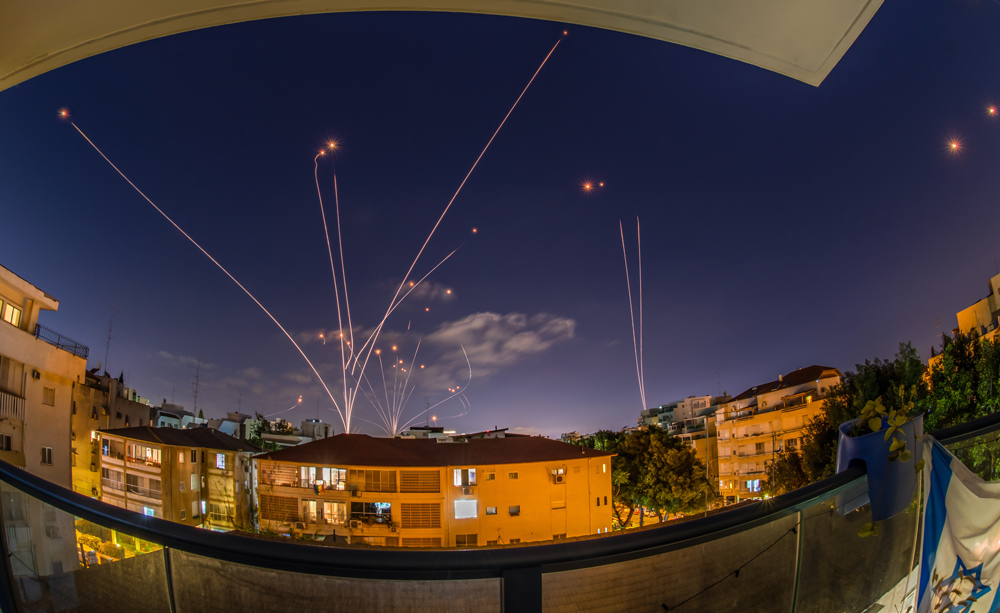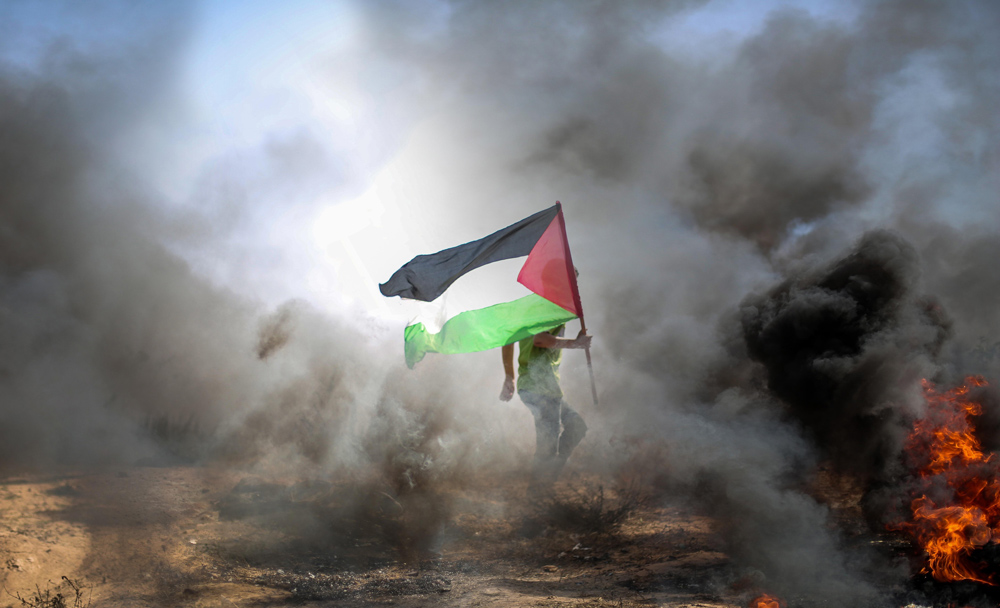

Letter from Israel
Under the reign of fear, handshakes are impossible.
By Oded Na’aman
It is now 1pm, Wednesday 18 October, and I am at home, in Tel Aviv. Eleven days have passed since the 7 October attack on Israel. At least 1400 people were killed in one day, mostly civilians, and there are around 200 Israeli hostages held in the Gaza Strip. Israel has since launched its deadliest attack on Gaza so far: around 3500 Gazans have been killed, about 1000 of them children. Hamas still manages to fire rockets at Israel, mostly toward towns closer to Gaza, but some toward Tel Aviv. Every evening, between 7pm and 9pm, sirens go off and we run to find shelter. During the day we can sometimes hear unidentified explosions in the distance. There are many ambulances and police sirens; helicopters and fighter jets pass overhead, and there’s a constant sound of drones hovering over the city, to what purpose we do not know. Most stores are closed. Many restaurants and cafes have been transformed into supply centres from which food and equipment are delivered by volunteers across the country to soldiers, to survivors of the attack, and to residents from towns that have been evacuated. At night, a few bars open. They are half empty, the patrons drink and speak softly. On normal days, the city is packed and vibrant till late into the night. Around midnight, I go out to the balcony or take a stroll in the vacant streets. Everywhere, the quiet is breathless.
In this land, nothing is very far. A leisurely drive from Tel Aviv to Gaza City, if it were possible, would take about one hour. By the end of this week, in the span of 14 days, a total of 5000 people – Israeli and Palestinian — will have died, many more lives will have been ruined beyond repair; horror, panic and hatred will have been instilled in masses of people, not only here, in this small land, but across the globe. Darkness behind us, darkness ahead.
Many lives will have been ruined beyond repair; horror, panic and hatred will have been instilled in masses of people, not only here, in this small land, but across the globe. Darkness behind us, darkness ahead.
I write down the date and time because every thought and observation is quickly rendered obsolete. Anything I write can only be a journal entry, a document addressed to the future from a past that cannot know itself. Every day, we learn more about what happened but are late to realise what is going on. By the time we understand something, something else has happened that we can’t even begin to imagine. Every day, we learn of more horrific stories, each one incomprehensible: last messages from loved ones as the gunmen approached, people burned alive inside their homes, children seeing their parents being killed in front of their eyes, whole families executed. Every day, the story of how we got to the present moment is retold or replaced, but no story can be sustained, no story is convincing. Each day, I wake up and look at my phone to figure out which of my nightmares is real and which is not yet. Last night, hundreds of people were killed in a bombing of al-Ahli Arab hospital. Who is to blame? Fingers are being pointed in different directions, various pieces of evidence are being proffered, but the dead can neither raise their fingers nor study the evidence. Every day, Israeli families are begging politicians to free their children, cousins, siblings, parents, and grandparents, who are being held hostage. The politicians respond that victory is more important than freeing the hostages. That this is being said and that it is being accepted is yet another horror all unto itself. To even begin to fathom the suffering and loss of the last 11 days is to come undone; we hang on to denial as if to our dear lives. But we are failing: we are coming undone. And none of it is over, more is coming. The future is approaching us like a black hole. Those who will die tomorrow are walking among us today. Are we them?
I heard somewhere that the ritual of the handshake originated from a procedure for the establishment of trust. The hand is shown to be empty of weapon, and thus physical proximity can be tolerated; trust is expressed by the touching of hands — hands holding each other instead of weapons. But some prior sense of safety is a condition for this procedure. The other person might be too dangerous even to get near let alone to touch, or the person might hold a weapon in the other hand — the one that has not been revealed. The establishment of trust cannot take place under the reign of fear. I feel that we have entered, now more totally than ever, into a time when handshakes are impossible.

Iron Dome rockets intercept Hamas rockets during a night attack on Israel’s city of Ashdod. Photo: Shutterstock
The dichotomy of recognition is fueled by the deeply internalised, longstanding narratives that we resort to in order to make sense of the horror.
Since 7 October there have been fierce debates around the world about condemnation and empathy. Some who sympathise with the Palestinian demand for freedom and the end of occupation and apartheid have refused to condemn or express grief over the mass killing of Israeli civilians and have perceived any show of empathy toward Israelis as a failure or even betrayal of the Palestinian cause. Others have called for a “humane left” committed to mourning the loss of all civilians, and they see this commitment as the basis of their resistance to Israeli occupation and apartheid. Meanwhile, in Israel, any show of empathy toward the suffering of Palestinians, or any rejection of calls to “flatten Gaza”, is seen as a failure of solidarity, bordering on treason, even while some of the survivors and family members of the victims of the attack declare that they themselves oppose the killing of civilians in Gaza.
At first, I couldn’t understand the various demands and refusals of empathy. Why resist showing empathy with civilian victims, no matter who they are? And why should the expression or denial of empathy be made into a condition for engaging in discussion? It seems to me now that these clashes have to do with the impossibility of handshakes. Genuine conversation depends on mutual recognition. To be recognised is, very roughly, to be publicly acknowledged as someone whose existence and dignity should be protected. When recognition is in doubt, expressions of empathy may be demanded in order to make recognition explicit. Expressions of empathy are like the baring of one’s hand. But if, as many feel at this moment, the recognition of one “side” comes at the expense of the other, the expression of empathy for one is the refusal of empathy for another. Many seem to feel that no hand is bare — that all hands are holding knives, pointing in opposite directions. This moment is characterised by a widespread conviction that recognition can only go in one direction: that any show of empathy toward Israelis is tantamount to supporting the oppression of Palestinians, and that any show of empathy toward Palestinians is tantamount to supporting the massacre on 7 October.
I heard somewhere that the ritual of the handshake originated from a procedure for the establishment of trust. The hand is shown to be empty of weapon, and thus physical proximity can be tolerated; trust is expressed by the touching of hands — hands holding each other instead of weapons.

Photo: Shutterstock
Those who subscribe to this dichotomy see attempts to recognise all suffering as disingenuous and manipulative. They sometimes complain that symmetrical empathy entails symmetrical judgement, symmetrical condemnation, or attribution of symmetrical power. And since they reject these equivalences, they reject the equivalence of empathy. But empathy for all those who suffer doesn’t entail any of these equivalences. In principle, at least, people of opposite political views can consistently empathise with both Palestinian and Israeli suffering and yet vehemently disagree about who’s at fault, what should be done, and where justice lies.
I doubt the concern with false symmetries is the main driver behind the dichotomy of recognition. It is fueled in part by anti-Semitism and Islamophobia — a hatred of Jews, Arabs, or Muslims, found across the political spectrum, by which certain groups of people assert their identity and agency, revealing themselves as morally vile. But I believe the dichotomy is primarily fuelled by panic and helplessness, by the deeply internalised, longstanding narratives that we resort to in order to make sense of the horror of the past 11 days. What happened is seen by many as proof that Israeli Jews and Palestinians cannot coexist, in the most literal sense of the term. It is important to understand why this is the conclusion so many reach. I can only try to speak to the Israeli reaction.
In the Israeli imagination, this land should have been empty when Jews immigrated here to settle it in the first half of the 20th century: the vacant land of Israel, waiting for its children to return to it after two millennia in exile, to find refuge from their troubles. This land, we were raised to believe, is the one place Jews can claim as their own, the one place where we belong. But, as history would have it, the land was not empty and the people who lived here were reluctant to leave and hostile to the Zionist project. The existence of Palestinians in this land and their resistance to Israel was always seen as the main obstacle to realising the Israeli dream, and Israel has responded to it by using force to push Palestinians away and to keep those who remain at bay. The full acknowledgment of Palestinians as equal citizens would have required a substantial change in the conception of Israel as a Jewish project, while the founding of an independent Palestinian state would have required Israel to give up parts of the land that are also widely seen as essential to the Israeli project. Furthermore, many Israelis see violent Palestinian resistance to the growing Jewish community in the first decades of the 20th century and, later, to the founding of Israel in 1948 as proof that Palestinian political freedom poses an intolerable risk to Israel’s existence. What the majority of Israelis find impossible to accept is that many Palestinians see this land as their home — that those here are deeply committed to staying here and that those who are refugees aspire to return.
